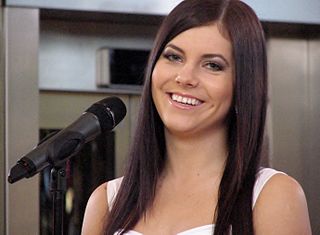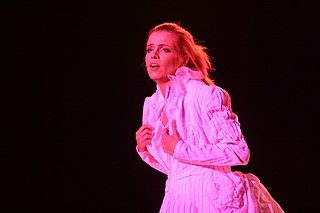
Estonia has participated in the Eurovision Song Contest 29 times since making its debut in 1994. Its first appearance would have taken place in 1993 but a qualification round was installed for seven former Eastern Bloc countries hoping to make their debut in the contest, with Estonia failing to qualify. Estonia has won the contest once, in 2001. The current Estonian participant broadcaster in the contest is Eesti Rahvusringhääling (ERR).
Estonia was represented at the Eurovision Song Contest 1999 with the song "Diamond of Night", composed by Priit Pajusaar and Glen Pilvre, with lyrics by Maian Kärmas and Kaari Sillamaa, and performed by Evelin Samuel and Camille. The Estonian participating broadcaster, Eesti Televisioon (ETV), organised the national final Eurolaul 1999 in order to select its entry for the contest. Ten songs competed in the national final and "Diamond of Night" performed by Evelin Samuel and Camille was selected as the winner by a jury panel.

Birgit Sarrap, also known mononymously as Birgit, is an Estonian singer. She rose to prominence in 2007 after winning the first season of Eesti otsib superstaari, the Estonian version of Idol. Her debut self-titled studio album was later released in 2008. Birgit has gone on to release four other studio albums in her career.

Nele-Liis Vaiksoo is an Estonian singer and actress, known for her work in musical theatre.
Estonia participated in the Eurovision Song Contest 2009 with the song "Rändajad" written by Sven Lõhmus. The song was performed by the group Urban Symphony. The Estonian broadcaster Eesti Rahvusringhääling (ERR) organised the national final Eesti Laul 2009 in order to select the Estonian entry for the 2009 contest in Moscow, Russia. Ten songs competed in the national final and the winner was selected over two rounds of voting. In the first round, a jury panel and a public vote selected the top two to qualify to the superfinal. In the superfinal, "Rändajad" performed by Urban Symphony was selected as the winner entirely by a public vote.

Sandra Nurmsalu is an Estonian singer, songwriter, and violinist. Recognized within Estonia for her genre-bending style, Nurmsalu has garnered success as both the lead singer of Urban Symphony and as a solo artist.

Maian-Anna Kärmas is an Estonian singer, songwriter, and journalist.
Estonia participated in the Eurovision Song Contest 2010 with the song "Siren" written by Robin Juhkental. The song was performed by Malcolm Lincoln and Manpower 4. The Estonian broadcaster Eesti Rahvusringhääling (ERR) organised the national final Eesti Laul 2010 in order to select the Estonian entry for the 2010 contest in Oslo, Norway. Ten songs competed in the national final and the winner was selected over two rounds of voting. In the first round, a jury panel and a public vote selected the top two to qualify to the super final.In the super final, "Siren" performed by Malcolm Lincoln and Manpower 4 was selected as the winner entirely by a public vote.

Robin Juhkental is an Estonian singer. He is the frontman of Malcolm Lincoln.
Estonia participated in the Eurovision Song Contest 1998 with the song "Mere lapsed" written by Maria Rahula, Tomi Rahula and Peeter Pruuli. The song was performed by Koit Toome. The Estonian broadcaster Eesti Televisioon (ETV) organised the national final Eurolaul1998 in order to select the Estonian entry for the 1998 contest in Birmingham, United Kingdom. Ten songs competed in the national final and "Mere lapsed" performed by Koit Toome was selected as the winner by a jury panel.
Estonia was represented at the Eurovision Song Contest 2000 with the song "Once in a Lifetime", composed by Pearu Paulus, Ilmar Laisaar, and Alar Kotkas, with lyrics by Jana Hallas, and performed by Ines. The Estonian participating broadcaster, Eesti Televisioon (ETV), organised the national final Eurolaul 2000 in order to select its entry for the contest. Ten songs competed in the national final and "Once in a Lifetime" performed by Ines was selected as the winner by a jury panel.
Estonia participated in the Eurovision Song Contest 2011 with the song "Rockefeller Street" written by Sven Lõhmus. The song was performed by Getter Jaani. The Estonian broadcaster Eesti Rahvusringhääling (ERR) organised the national final Eesti Laul 2011 in order to select the Estonian entry for the 2011 contest in Düsseldorf, Germany. The national final consisted of three shows: two semi-finals and a final. Ten songs competed in each semi-final and the top five from each semi-final as determined by a jury panel and public vote qualified to the final. In the final, the winner was selected over two rounds of voting. In the first round, a jury panel and a public vote selected the top two to qualify to the superfinal. In the superfinal, "Rockefeller Street" performed by Getter Jaani was selected as the winner entirely by a public vote.
Estonia participated in the Eurovision Song Contest 2012 with the song "Kuula" written by Ott Lepland and Aapo Ilves. The song was performed by Ott Lepland. The Estonian broadcaster Eesti Rahvusringhääling (ERR) organised the national final Eesti Laul 2012 in order to select the Estonian entry for the 2012 contest in Baku, Azerbaijan. The national final consisted of three shows: two semi-finals and a final. Ten songs competed in each semi-final and the top five from each semi-final as determined by a jury panel and public vote qualified to the final. In the final, the winner was selected over two rounds of voting. In the first round, a jury panel and a public vote selected the top two to qualify to the superfinal. In the superfinal, "Kuula" performed by Ott Lepland was selected as the winner entirely by a public vote.
Estonia participated in the Eurovision Song Contest 2013 with the song "Et uus saaks alguse" written by Mihkel Mattisen and Silvia Soro. The song was performed by Birgit. The Estonian broadcaster Eesti Rahvusringhääling (ERR) organised the national final Eesti Laul 2013 in order to select the Estonian entry for the 2013 contest in Malmö, Sweden. The national final consisted of three shows: two semi-finals and a final. Ten songs competed in each semi-final and the top five from each semi-final as determined by a jury panel and public vote qualified to the final. In the final, the winner was selected over two rounds of voting. In the first round, a jury panel and a public vote selected the top two to qualify to the superfinal. In the superfinal, "Et uus saaks alguse" performed by Birgit was selected as the winner entirely by a public vote.
Estonia participated in the Eurovision Song Contest 2014 with the song "Amazing" written by Timo Vendt and Tanja. The song was performed by Tanja. The Estonian broadcaster Eesti Rahvusringhääling (ERR) organised the national final Eesti Laul 2014 in order to select the Estonian entry for the 2014 contest in Copenhagen, Denmark. The national final consisted of three shows: two semi-finals and a final. Ten songs competed in each semi-final and the top five from each semi-final as determined by a jury panel and public vote qualified to the final. In the final, the winner was selected over two rounds of voting. In the first round, a jury panel and a public vote selected the top two to qualify to the superfinal. In the superfinal, "Amazing" performed by Tanja was selected as the winner entirely by a public vote.
Estonia participated in the Eurovision Song Contest 2016 with the song "Play" written by Fred Krieger, Stig Rästa and Vallo Kikas. The song was performed by Jüri Pootsmann. The Estonian broadcaster Eesti Rahvusringhääling (ERR) organised the national final Eesti Laul 2016 in order to select the Estonian entry for the 2016 contest in Stockholm, Sweden. The national final consisted of three shows: two semi-finals and a final. Ten songs competed in each semi-final and the top five from each semi-final as determined by a jury panel and public vote qualified to the final. In the final, the winner was selected over two rounds of voting. In the first round, a jury panel and a public vote selected the top three to qualify to the superfinal. In the superfinal, "Play" performed by Jüri Pootsmann was selected as the winner entirely by a public vote.
Estonia participated in the Eurovision Song Contest 2017 with the song "Verona" written by Sven Lõhmus. The song was performed by Koit Toome, who had previously represented Estonia in the Eurovision Song Contest in 1998 where he placed twelfth with the song "Mere lapsed", and Laura, who had previously represented Estonia in the Eurovision Song Contest in 2005 as part of the group Suntribe where she failed to qualify to the final with the song "Let's Get Loud". The Estonian broadcaster Eesti Rahvusringhääling (ERR) organised the national final Eesti Laul 2017 in order to select the Estonian entry for the 2017 contest in Kyiv, Ukraine. The national final consisted of three shows: two semi-finals and a final. Ten songs competed in each semi-final and five from each semi-final as determined by a jury panel and public vote qualified to the final. In the final, the winner was selected over two rounds of voting. In the first round, a jury panel and a public vote selected the top three to qualify to the super final. In the super final, "Verona" performed by Koit Toome and Laura was selected as the winner entirely by a public vote.
Estonia participated in the Eurovision Song Contest 2018 with the song "La forza" written by Mihkel Mattisen, Timo Vendt, Ksenia Kuchukova and Elina Nechayeva. The song was performed by Elina Nechayeva. The Estonian broadcaster Eesti Rahvusringhääling (ERR) organised the national final Eesti Laul 2018 in order to select the Estonian entry for the 2018 contest in Lisbon, Portugal. The national final consisted of three shows: two semi-finals and a final. Ten songs competed in each semi-final and five from each semi-final as determined by a jury panel and public vote qualified to the final. In the final, the winner was selected over two rounds of voting. In the first round, a jury panel and a public vote selected the top three to qualify to the superfinal. In the superfinal, "La forza" performed by Elina Nechayeva was selected as the winner entirely by a public vote.
Estonia originally planned to participate in the Eurovision Song Contest 2020 with the song "What Love Is" written by Uku Suviste and Sharon Vaughn. The song was performed by Uku Suviste. The Estonian broadcaster Eesti Rahvusringhääling (ERR) organised the national final Eesti Laul 2020 in order to select the Estonian entry for the 2020 contest in Rotterdam, Netherlands. The national final consisted of three shows: two semi-finals and a final. Twelve songs competed in each semi-final and six from each semi-final as determined by a jury panel and public vote qualified to the final. In the final, the winner was selected over two rounds of voting. In the first round, a jury panel and a public vote selected the top three to qualify to the superfinal. In the superfinal, "What Love Is" performed by Uku Suviste was selected as the winner entirely by a public vote.
Estonia participated in the Eurovision Song Contest 2021 with the song "The Lucky One" performed by Uku Suviste and written by Suviste himself along with Sharon Vaughn. The Estonian broadcaster Eesti Rahvusringhääling (ERR) organised the national final Eesti Laul 2021 in order to select the Estonian entry for the 2021 contest in Rotterdam, Netherlands. The national final consisted of three shows: two semi-finals and a final. Twelve songs competed in each semi-final and six from each semi-final as determined by a jury panel and public vote qualified to the final. In the final, the winner was selected over two rounds of voting. In the first round, a jury panel and a public vote selected the top three to qualify to the superfinal. In the superfinal, "The Lucky One" performed by Uku Suviste was selected as the winner entirely by a public vote.






